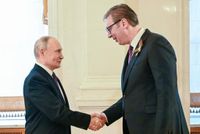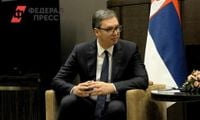On May 9, 2025, Serbian President Aleksandar Vučić attended the Victory Parade in Moscow, marking the 80th anniversary of the Soviet Union's victory over Nazi Germany in World War II. His presence at this significant event has sparked discussions regarding Serbia's longstanding ties with Russia, as well as the implications of Vučić's foreign policy decisions.
Former CSKA Moscow and Serbian national team football player Zoran Tošić expressed his views on the matter during an interview with Match TV. He stated that he was not surprised by Vučić's attendance, emphasizing the warm relationship between Serbia and Russia. "We remember that Russia has always been there for us, especially in difficult times. Therefore, I wasn't surprised that our president flew to Victory Day," Tošić noted.
Victory Day is a significant holiday for both Russia and Serbia, with Tošić highlighting its importance: "Given that Russia and Serbia were on the same side during the war, this is a big holiday for us. It's clear that in Russia, more attention is given to Victory Day, as the USSR was the main country that fought alongside us in that war." He further remarked that he often sees Vučić in Moscow, indicating the president's frequent support for Russia.
Vučić's visit comes at a time when his recent American tour was deemed unsuccessful, raising questions about his foreign policy strategy. According to political analyst Đorđe Vukadinović, Vučić's attendance at the parade was essential to maintain his image of political balance. "If he had not appeared in Moscow, his policy of wise balancing would fall apart," Vukadinović explained. He noted that the Serbian public largely supports close ties with Russia, a sentiment that is often misunderstood by Western observers.
During the celebrations, Russian national team players, including Valery Karpin, read a poem titled "Rodina" in honor of Victory Day, while other athletes reflected on the significance of the occasion. Artem Dzyuba commented, "Our generation must not only remember and honor the feat of heroes but also pass this memory on to our children."
As the parade unfolded, it became evident that Vučić's presence was not merely ceremonial. His attendance was interpreted as a political statement, reinforcing Serbia's alignment with Russia amidst ongoing tensions with the West. Vukadinović pointed out that Vučić's decision to attend the parade may serve as a message to his supporters: "You support those who are for Picula, and I went to Putin," he suggested, referring to the contrasting popularity of Russian President Vladimir Putin compared to Western leaders.
Critics of Vučić's government have voiced concerns about the implications of his foreign policy. Naim Leo Beširi, director of the Institute for European Affairs, stated, "In Moscow, there are dictators and autocrats, and in this way, Vučić revives his radical image from the 1990s. The story of European integration is a simple lie to stay in power as long as possible and to enrich those around him." Beširi emphasized that the repercussions of Vučić's actions would likely resonate throughout Europe, particularly given the ongoing stagnation in Serbia's European integration efforts.
Despite the criticism, Vučić's supporters maintain that his approach reflects a pragmatic strategy to navigate Serbia's complex geopolitical landscape. "The entire PR tour from America to Moscow should demonstrate the state wisdom of Aleksandar Vučić," Beširi noted, hinting that Vučić's actions are a calculated effort to bolster his image domestically.
The European Union's response to Vučić's visit remains uncertain. Vukadinović pointed out that Brussels has limited tools to address the situation, as the EU itself grapples with numerous internal issues. "The EU's European path has practically entered a deadlock, and no one in the current government seems too worried about this," he remarked.
As the celebrations continued, the atmosphere was charged with national pride, not just in Russia but also among Serbian attendees. Former footballer Dmitry Sennikov shared his plans for celebrating Victory Day, reflecting the collective sentiment of remembrance and honor among the Serbian people.
In addition to the parade, discussions about the significance of the day were prevalent among athletes and public figures. Ex-footballer Sergey Kiryakov expressed, "Victory Day is a sacred holiday, and I am proud that my ancestors defeated fascism." Meanwhile, ex-football player Dmitry Prudnikov emphasized, "May 9 is the most significant day for all of us, for the entire Russian people."
As the day progressed, the focus shifted to the younger generation, with Zenit coach Sergei Semak wishing that current and future generations learn to value life and love their country. The importance of passing on the legacy of the war heroes to the youth was echoed by various figures, including Bulykin, who stated, "I always watch the Victory Parade. I am proud of the country in which I live."
However, Vučić's visit to Moscow has also sparked a game of nerves with students back home, as they have called for extraordinary parliamentary elections. Vučić's response indicated his control over the political landscape, stating, "Let them prepare for the elections; this will happen when an incompetent institution signs it." This statement reflects his confidence in navigating the political pressures surrounding his administration.
In conclusion, Vučić's attendance at the Victory Parade in Moscow serves as a multifaceted symbol of Serbia's historical ties with Russia, while also reflecting the complexities of his political maneuvering in the face of international scrutiny. As Serbia continues to grapple with its identity and foreign relations, the implications of Vučić's actions will undoubtedly shape the nation's future.


